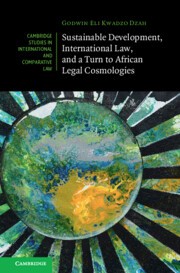Book contents
- Sustainable Development, International Law, and a Turn to African Legal Cosmologies
- Cambridge Studies in International and Comparative Law: 185
- Sustainable Development, International Law, and a Turn to African Legal Cosmologies
- Copyright page
- Dedication
- Contents
- Foreword
- Preface
- Acknowledgements
- Abbreviations
- Introduction
- Part I Mise en Scène
- Part II Universal, Pluriversal, and in Between
- Part III Thinking Alternatives
- 5 Sustainable Development and the Turn to African Legal Ontologies
- 6 Ecocosmologies, Ecolegality, and African Environmentalisms as Ecological Law
- 7 Conclusion
- Bibliography
- Index
- Cambridge Studies in International and Comparative Law
5 - Sustainable Development and the Turn to African Legal Ontologies
from Part III - Thinking Alternatives
Published online by Cambridge University Press: 16 May 2024
- Sustainable Development, International Law, and a Turn to African Legal Cosmologies
- Cambridge Studies in International and Comparative Law: 185
- Sustainable Development, International Law, and a Turn to African Legal Cosmologies
- Copyright page
- Dedication
- Contents
- Foreword
- Preface
- Acknowledgements
- Abbreviations
- Introduction
- Part I Mise en Scène
- Part II Universal, Pluriversal, and in Between
- Part III Thinking Alternatives
- 5 Sustainable Development and the Turn to African Legal Ontologies
- 6 Ecocosmologies, Ecolegality, and African Environmentalisms as Ecological Law
- 7 Conclusion
- Bibliography
- Index
- Cambridge Studies in International and Comparative Law
Summary
Chapter 5 argues that an alternative ontological basis, derived from non-Western ontologies, is both possible and urgent for renewing sustainable development. It analyses how the voice of the Global South; particularly Africa, can improve the discourse on sustainable development by evolving a view on the importance of customary law, ethics, and Indigenous norms as law. It echoes the idea of ‘ecology of knowledges’ and the legal value of reviving non-Western epistemologies for sustainable development. The spotlighting of ethics, customary norms, and other forms of local and Indigenous knowledge as legal norms has been done before. However, in this book, I extend the discussion even further and do so through a comparative analysis with other bodies of legal ideas and normativity like transnational law, legal pluralism, and social construction as law in themselves. In this process, I give these ideas a unique twist for the purposes of the overall critical perspective of this project by demonstrating their usefulness for foregrounding customary law or Indigenous knowledge as law. The discussion refracts the idea of reimagining sustainable development praxis through the lens of oft-neglected African legal cosmologies, and how such experiences can provide helpful signposts in Africa and elsewhere.
Keywords
- Type
- Chapter
- Information
- Publisher: Cambridge University PressPrint publication year: 2024

